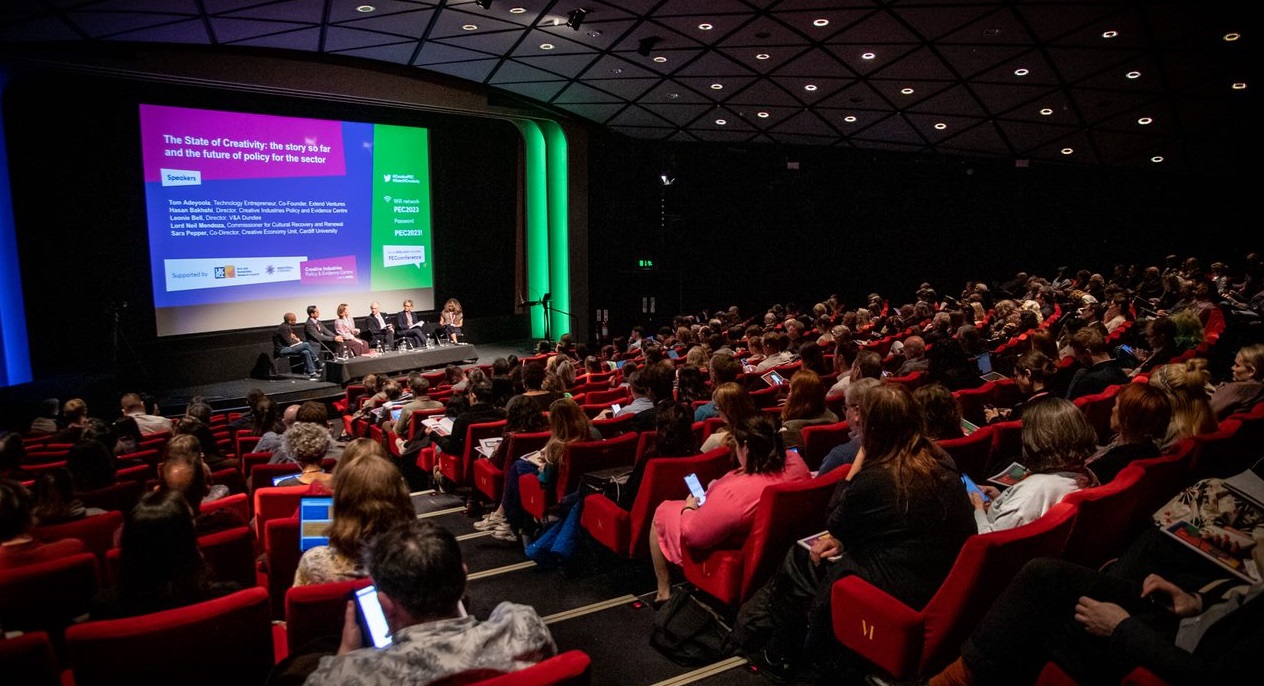Creative PEC: supporting inclusive and sustainable growth of the UK’s creative industries
15 June 2023 | By: Hasan Bakhshi (Director) and Giorgio Fazio (Research Director) | 3 min read
Newcastle University is the current co-host of the Creative Industries Policy and Evidence Centre (Creative PEC). Find out how this collaborative research initiative gives evidence-based policy insights and analysis to support the creative industries.
Contents:
1. What is the Creative Industries Policy & Evidence Centre?
2. Making the North of England an exemplary case study
5. Find out more about our work
What is the Creative Industries Policy & Evidence Centre?
This month, Newcastle University became home to the Creative Industries Policy & Evidence Centre (Creative PEC). Following a bidding process, the University - alongside co-host the Royal Society of Arts (RSA) - secured the Arts and Humanities Research Council’s support for our vision of a north-south, twin-hub Creative PEC which will bring benefits to the creative industries across the whole country.
The overarching focus of the next five years of the AHRC funding award will be supporting inclusive and sustainable growth of the creative sector. From fashion and film to design and publishing, the creative industries have the power to boost productivity, create ‘good’, future-proof jobs, help tackle climate change and improve community well-being and social cohesion. Maintaining and building on the UK’s global standing in this fast-moving sector requires policies that are underpinned by robust, independent evidence.
Through our new northern hub in Newcastle, we want to make the North of England an exemplary case study of how evidence can support local policy development for the creative industries, serving, in time, as a model for other areas of the UK.
Since its inception in 2018 (initially led by Nesta), the Creative PEC has brought about a step change in the quality of evidence to policy decisions. From June 2023, the Creative PEC enters an exciting new phase in its journey. The opportunity is huge. We want to work with partners across the University, such as Insights North East, Creative Fuse North East and the National Innovation Centre for Data, the North East of England and beyond, to ensure maximum impact.
Making the North of England an exemplary case study
We know the whole sector benefits when researchers, policymakers and industry professionals collaborate and understand each other's timescales, language and modes of working. The Creative PEC is uniquely placed to bridge these disciplines.
Through adding a new central Research Unit at Newcastle University to our consortium of researchers, we will introduce even more agility and responsiveness into our research agenda, nurturing a new generation of quantitative social scientists working on the creative industries.
We will also convene a new network of PEC Research Fellows. Our ambition is for this to become the global network of choice for analysts working on creative industries policy. We will launch a new seminar series and deepen our engagement with creative industry practitioners through revitalising our network of Industry Champions. Our twin-hub model and our increased global perspective will enable us to target policy interventions at the local, regional, national and international levels.
A creativity revolution
A number of our Creative PEC colleagues will continue to work in London, from our southern hub at RSA House.
Situated in Westminster, this base will give our Policy Unit access to officials and Ministers who are located in Whitehall. This will support the Creative PEC’s distinctive ‘hands on’ approach to policy influence – what we call “embedded knowledge exchange”. Importantly, it will also enable us to partner and collaborate with the RSA on programme and engagement activity.
As Andy Haldane, Chief Executive, of the RSA says ‘By combining the very best analysis and research, with the RSA’s on-the-ground programme of work, we believe we can realise the enormous potential of the creative industries to grow jobs and skills, income and exports, health and happiness, in communities right across the UK. The UK needs a creativity revolution and the Creative PEC can be its centrepiece.”
Data-led reporting
Over the next five years, Creative PEC will publish regular State of the Nation-style reporting in recognition of the growing availability of data in key areas of policy. The areas for this regular reporting will be:
- R&D, innovation and clusters (led by University of Sussex)
- creative education, skills, talent (led by Work Advance)
- internationalisation (led by Newcastle University)
- the arts, cultural and heritage sectors (led by The University of Sheffield)
In addition, we will continue to undertake primary research in critical policy areas for the creative industries such as intellectual property, public service broadcasting and access to finance. Cutting across all our work will be two vital research agendas: how to make the creative industries workforce more representative and inclusive, and what changes must the creative industries enact to help tackle the climate emergency.
As we embark on the next stage of the journey, and with a new Sector Vision from the DCMS upon us, we invite colleagues across the University and beyond to be part of this refreshed drive to shape the future growth of the UK’s creative industries.
Find out more about our work
Interested in finding out more about what we do?
We provide independent research and policy recommendations for the UK’s creative industries, and are keen to engage everyone in our mission, from the creative freelancer to the multinational.
Follow us on Twitter or send us an email to sign up to our monthly newsletter.
Header image caption: The Creative PEC’s State of Creativity Conference, BFI, 2023 C. Beth Crockatt.
You might also like:
- Explore the work of the Creative Industries Policy and Evidence Centre
- Find out how Newcastle University’s world-leading research is informing policy for the creative industries
- Read about Creative PEC from Professor Nigel Harkness (Pro-Vice-Chancellor for Humanities and Social Sciences)
- Sign up to the Creative PEC newsletter
- Discover RSA, the Creative PEC’s southern hub
